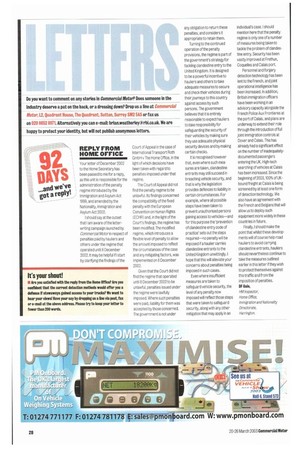REPLY FROM HOME OFFICE
Page 28

If you've noticed an error in this article please click here to report it so we can fix it.
Your letter of December 2002 to the Home Secretary has been passed to me for a reply, as this unit is responsible for the administration of the penalty regime introduced by the Immigration and Asylum Act 1999, and amended by the Nationality, Immigration and Asylum Act 2002.
I should say at the outset that I am aware of the letterwriting campaign launched by Commercial Motorin respect of penalties paid by hauliers and others under the regime that operated until 8 December 2002. It may be helpful if I start by clarifying the findings of the Court of Appeal in the case of International Transport Roth GmbH v The Home Office, in the light of which decisions have been taken with regard to penalties imposed under that regime.
The Court of Appeal did not find the penalty regime to be unlawful. Its findings concerned the compatibility of the fixed penalty with the European Convention on Human Rights (ECHR land, in the light of the Court's findings, the regime has been modified. The modified regime, which introduces a flexible level of penalty to allow the amount imposed to reflect the circumstances of the case and any mitigating factors, was implemented on 8 December 2002.
Given that the Court did not find the regime that operated until 8 December 2002 to be unlawful, penalties issued under the regime were lawfully imposed. Where such penalties were paid, liability for them was accepted by those concerned. The government is not under any obligation to return these penalties, and considers it appropriate to retain them.
Turning to the continued operation of the penalty provisions, the regime is part of the government's strategy for tackling clandestine entry to the United Kingdom. it is designed to be a powerful incentive to hauliers and others to take adequate measures to secure and check their vehicles during their journeys to this country against access by such persons. The government believes that it is entirely reasonable to expect hauliers to take responsibility for safeguarding the security of their vehicles by making sure they use adequate physical security devices and by making certain checks.
It is recognised however that, even where such measures are taken, clandestine entrants may still succeed in breaching vehicle security, and that is why the legislation provides defences to liability in certain circumstances. For example, where all possible steps have been taken to prevent unauthorised persons gaining access to vehicles—and for this purpose the 'prevention of clandestine entry code of practice' sets out the steps required—no penalty will be imposed if a haulier carries clandestine entrants to the United Kingdom unwittingly. I hope that this will alleviate your concerns about penalties being imposed in such cases.
Even where insufficient measures are taken to safeguard vehicle security, the level of any penalty now imposed will reflect those steps that were taken to safeguard security, along with any other mitigation that may apply in an individual's case. I should mention here that the penalty regime is only one of a number of measures being taken to tackle the problem of clandestine entry. Security has been vastly improved at Frethun, Coquelles and Calais port.
Personnel and forgery detection technology has been lent to the French, and joint operational intelligence has been increased. In addition, British immigration officers have been working in an advisory capacity alongside the French Police Aux Frontieres at the port of Calais, and plans are underway to extend their role through the introduction of full joint immigration controls at Dover and Calais. This has already had a significant effect on the number of inadequately' documented passengers entering the UK. High-tech searching of vehicles at Calais has been increased. Since the beginning of 2003,100% of UKbound freight at Calais is being screened by at least one form of detection technology. We also have an agreement with the French and Belgians that will allow us to deploy such equipment more widely in these countries in future.
Finally, I should make the point that whilst these developments will of course help road hauliers to avoid carrying clandestine entrants. hauliers should nevertheless continue to take the measures outlined earlier in this letter if they wish to protect themselves against this traffic and from the imposition of penalties.
OF Bale, HM inspector, Home Office, immigration and Nationality Directorate, Harrington.








































































































































































